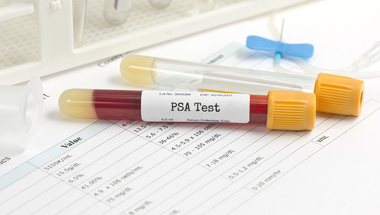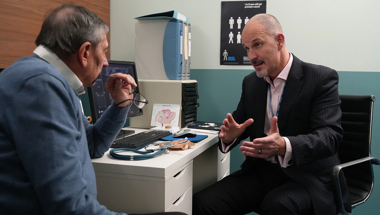Campaigns
05 Mar 2025The pros and cons of PSA self-test kits for prostate cancer
For men wanting reassurance about their risk of prostate cancer, at-home PSA blood tests seem to offer a fast, convenient alternative to free NHS testing. But could they be doing more harm than good? Our Health Influencing Senior Officer (Earlier Diagnosis Lead), Andrew Seggie, takes a closer look.

Prostate-Specific Antigen (PSA) self-tests are becoming increasingly common, with kits being sold online and at high street pharmacies.
Marketed as faster than waiting for a GP appointment, they also come without the guidance and reassurance that a healthcare professional can offer.
Here, we take a closer look at what the tests claim, how the tests work, and what to do if you’re concerned.
What is a PSA self-test kit?
At-home ‘prostate health’ or PSA blood tests are kits that anyone over the age of 18 can buy online or in-store. They include materials that enable you to collect your own blood sample for testing your PSA level.
PSA self-test kits are often marketed as ‘convenient’, ‘simple’, ‘reliable’, and providing ‘reassurance’ to people who might be concerned about their risk of prostate cancer or their general prostate health. However, much of the marketing focuses on the issue of screening and testing for prostate cancer.
Yet a PSA blood test is not a test for prostate cancer, but a test to help spot potential problems with the prostate. By itself, a PSA blood test cannot diagnose or rule out prostate cancer.
In fact, a PSA blood test is only the first step in the pathway for diagnosing prostate cancer, identifying which men would benefit from further tests (such as an MRI scan).
The cost of an individual test ranges from £13-20 for rapid result kits, to £30-90 for laboratory-based results.
In contrast, a PSA blood test is free to men who request it from their GP, as well as to trans women and non-binary people who have a prostate.
How do PSA self-test kits work?
Most kits include equipment for you to collect a small sample of your own blood from your finger. These items include a finger-prick lancet (a small needle that can poke a hole in your skin), sterilising wipes, and plasters.
Some kits are designed for you to collect this blood sample in a small tube and send it off in a pre-paid envelope to the provider’s laboratory for testing. These results usually take between two and five working days.
The rapid test kits look like a COVID-19 test. You use a pipette to collect a few drops of blood from your finger-prick and drop a small amount onto the test cassette. The test gives you a result in five to 10 minutes.
What does a PSA self-test kit measure?
Both types of self-test kits measure your PSA level. PSA is a molecule produced by cells in the prostate – both normal cells and prostate cancer cells.
That means that, if you have a prostate, it’s normal to have a small amount of PSA in your blood. The amount rises slightly as you get older, and your prostate gets bigger. What’s more, an elevated PSA level can be caused by many factors, such as a urinary infection, an enlarged prostate, prostatitis, or prostate cancer.
How do I get my results?
Rapid tests tend to show one of two results: a ‘positive’ (higher PSA) or ‘negative’ (lower PSA) result, based on a cut-off of 4 nanograms of PSA per millilitre of blood (4.0 ng/mL).
For laboratory-based tests, you’ll usually be told a specific PSA value, similar to what you'd get if you’d had a PSA blood test through your GP.
In either case, if you get a raised result, you’ll still need to visit your GP to be referred to the hospital for further tests. Your GP will probably want to repeat the PSA blood test before deciding what to do next.
You'll also need to consider how you feel about interpreting the results on your own, without the support of a doctor or nurse. This is especially important if the PSA test result is ‘positive’ or raised, and suggests you need to be referred for further investigation. Receiving these results could be a worrying experience and lead to unnecessary anxiety, or false reassurance, depending on the test result.
What do my PSA results mean?
Our support pages have more information about understanding a PSA blood test result.
In general, most men have a PSA level less than 3.0 ng/mL, and GP guidelines say that men who don’t have possible symptoms of prostate cancer should be referred for further investigation when their PSA is 3.0 ng/mL or above.
For men who do have possible symptoms of prostate cancer, the guidelines for referral depend on the age of the man – from 2.5 ng/mL for men between 40 and 49, to 6.5 ng/mL for men aged 70 to 79.
But remember, a PSA blood test cannot rule out or diagnose prostate cancer alone. Your GP will usually look at your PSA blood test results alongside other information (such as your age, risk factors for prostate cancer, and general health) to support their decision making.
Are PSA self-test kits safe?
A BBC report has warned about the dangers of PSA self-test kits and how they can give men inaccurate results leading to anxiety and false reassurance. We recommend that if you’re worried about prostate cancer and want a PSA blood test, you should speak to your GP.
We haven’t tested the safety of any of the kits ourselves. However, some test kit providers state that they've been quality assured by the same accreditation schemes that would approve PSA testing via your GP. In the UK, this is usually the United Kingdom Accreditation Service (UKAS).
Medical laboratories that meet stringent requirements for quality and competence can be given ‘ISO 15189’ accreditation by UKAS, while ‘ISO 13485’ is the relevant standard for medical devices (such as PSA testing kits).
Some providers clearly state which accreditations they hold, or their laboratories hold, on their website. You might have to search around for this information, but it's sometimes listed in the FAQs section of the company website.
You could also check if a company has been accredited by UKAS, and whether the certificate that comes with the kit is valid, on the UKAS website. However, it's not always possible to find the company, or the laboratory they use, on this site.
Should I use a PSA self-test kit?
Without a national screening programme for prostate cancer, it can seem appealing to be able to access a PSA self-testing kit at your convenience.
But it’s important to understand that a PSA blood test is not a test for prostate cancer, but a test to help spot potential problems with your prostate. If your result is positive or raised, you’ll still need to visit your GP, as well as undergo further tests such as an MRI scan and possibly a biopsy, to diagnose or rule out cancer.
That’s why it’s crucial that, before you have a PSA blood test, you get balanced information or counselling from a healthcare professional, and that you get professional follow-up about your result and what to do next. The PSA self-test kits that we've seen do not offer that kind of counselling and follow-up.
Our 30-second online Risk Checker can help you understand your individual prostate cancer risk factors (based on age, ethnicity and family history) and arm you with the information you’ll need to talk to your GP about a PSA blood test.
More than 3 million men have now used the tool to make the best choice for them.
Our new Risk Information Service can also answer your questions about prostate cancer risk and the PSA blood test.
If you have additional concerns, for example symptoms you’re worried about, our Specialist Nurses are here to help on 0800 074 8383 or online via our Live Chat instant messaging service.







